
|
December 17, 2016 - No. 49 U.S. Presidential Election Results Significance for the Workers' Movement
• Need to
Confront Government of
Police Powers by Building the New U.S. Presidential Election Results Significance for the Workers' Movement On December 10, the Marxist-Leninist Party of Canada held a meeting in Hamilton on the significance of the U.S. election results for the workers' movement. The keynote speaker was Kathleen Chandler of the U.S. Marxist-Leninist Organization, and the meeting also featured Rolf Gerstenberger, President of the MLPC and former President of United Steelworkers Local 1005. This was the latest in a series of meetings across the
country organized by the MLPC for Party members, supporters and
friends as well as collectives of working people to sort out what
is taking place and what a Trump presidency will mean for the
peoples of the U.S. and Canada as well as the peoples of the
world. Discussion began in Calgary on November 6 on the eve of
the November 8 election, followed by a public meeting in Ottawa
on November 12 elaborating the statements issued by the Party before
and after the election.[1] Two
meetings were subsequently
held in Montreal, followed by
meetings in Edmonton, Windsor and within the Party's
organizations at the local level. All of these meetings serve to
provide a space for serious discussion and enable participants to
actually think about developments and analyze how to be pro-active in
the current conditions. They counter the constant pressure, during the
elections and since, to react to every comment and action by Trump,
making him, the individual, the problem, while hiding the significance
of U.S. rulers resorting to a government of police powers. Rolf Gerstenberger brought to the fore the experience of Hamilton steelworkers fighting to defend their rights, jobs and the steel industry, and how this gives them a perspective on what is going on in the U.S. He gave the example of President-Elect Donald Trump's nominee for Secretary of Commerce, Wilbur Ross. He recalled that as steelworkers fought Stelco's bankruptcy in 2003, they necessarily had to find out what had happened in the U.S. steel industry. They had been told that the U.S. steelworkers had "helped out" their companies and now Hamilton steelworkers should do the same for Stelco. At that time, some 40 U.S. steel companies sought Chapter 11 bankruptcy protection or actually went bankrupt and this was used to shaft 250,000 pensioners who had their benefits cut by 10 to 70 per cent. It was none other than Wilbur Ross who bought up various steel plants and was responsible for some 190,000 of these pensioners being deprived of their pensions and benefits, whom he termed collateral damage. Gerstenberger explained that Local 1005 categorically rejected any fraudulent use of bankruptcy proceedings to shaft the workers. The view of some U.S. labour leaders was that, "The house is on fire, you have four kids, but you can't save all of them -- which ones do you save?" Hamilton steelworkers rejected this craven position as an unacceptable capitulation to the neo-liberal agenda of the rich. He pointed out that neither parents nor first responders approach emergency situations by making such calculations. For instance, first responders go all to save all the victims of a fire. Only by fighting on a principled basis and putting all the necessary organization in place and devising strategies and tactics to achieve success, can the result be found acceptable, Gerstenberger said. Instead, the sacrifice of pensioners in the U.S. was presented by Wilbur Ross as an economic necessity. Some labour leaders still consider Ross a friend of the workers and they "have not raised a peep about his nomination." Gerstenberger pointed out that knowing this about Trump's pick for Secretary of Commerce gives an idea of the agenda of the incoming administration, despite its claims that it will look out for the "little guy" and support the workers. A representative of Ontario injured workers pointed out that what Trump and his cabinet stand for is precisely what is being put in place in Ontario under the Wynne Liberal government. For instance, the Ontario government has adopted Bill 70 that permits employers to self-regulate on matters of health and safety. He pointed out that those not considered of value in this business model, like injured workers, are simply disposed of. Regarding Trump's disposition to the workers and his claim that he will "make America great again" by bringing jobs back to the U.S., Gerstenberger referred to Trump's intervention with the Indiana factory -- air conditioner manufacturer Carrier -- that Trump claimed saved 1,100 jobs from being moved to Mexico. Trump tweeted that this is what he will do for all U.S. workers. The local union leader responsible for those workers pointed out only 800 jobs will stay and that hundreds of others will still be lost to a plant in Mexico. For presenting the real facts, the union leader was then subjected to all manner of personal attacks, first by Trump and then others unleashed by Trump's example. Trump used Twitter to attack the union president, calling him a "union boss" to imply that he is a parasite and claiming the union is taking excessively high dues, and other anti-union, anti-worker venom. The polity is then set in motion to either support or oppose what the Trump tweets set and this becomes the agenda until the next personal attacks are tweeted against somebody else. People not only in the U.S. but worldwide are supposed to hang on Trump's every tweet and the media speculation about them. Reducing politics to personal attacks and defamation on the part of the rulers is the level to which U.S. governance has degenerated, Gerstenberger pointed out, saying that this is how police powers operate where there is no modern political process of any kind, let alone due process of law when it comes to crime and punishment. The main issue in this situation, said Gerstenberger,
is to
take practical measures to change the situation in a way that
favours the workers. In Hamilton, the steelworkers face a sales
process and a company that is using the Companies' Creditors
Arrangement Act (CCAA) to attack the active and retired
workers through a court process that is considered perfectly
legal. How do the workers fight on this basis? The federal
government and MPs say nothing can be done from their point of
view because the matter is before the court and the federal
government does not have standing there. However, once a deal has
been reached, they can give money to the new owner. Once again Wilbur
Ross' line that in order
to "save the company" some of the pensioners and other things have to
be sacrificed is shamelessly followed, Gerstenberger said.
Steelworkers' own bitter experience shows that making the rich richer
has nothing to do with saving companies, he pointed out and anyone who
says differently is merely indulging in self-serving argument to get
what they want. Gerstenberger then addressed the positions of some of the main unions in the U.S. Some labour leaders say they are in disagreement with Trump's values but are willing to work with him when it comes to jobs. They have written Trump to say that they can find common ground on the economy. How can the issue of values and the economy be separate, Rolf asked, adding that all of this backwardness is being presented to split the working class so that it does not defend its class interests as a united front. This is also why the election results are presented as if the working people of the U.S. do not exist as American workers, but only in terms of race, gender, religion, and so on. The people are presented as divided in every possible way with disparate interests. All of it is to deny that there is one working class with its class interests, that people have rights by virtue of their being human and that everyone must unite to open society's path to progress on this basis.
Vigorous discussion followed on themes raised in the presentations and matters of concern to working people. A young worker spoke out about her experience of how politics is eliminated and people are pushed to look at matters like the U.S. election as entertainment. Concerns about how to put people in motion to defend their rights gave rise to discussion on the significance of collective discussion and decision-making so that the working people sort things out and proceed with confidence. Steelworkers spoke about the impunity of companies such as U.S. Steel to attack the livelihoods of Canadians, and the cynical claims of governments to be concerned with the people's well-being. Discussion also touched on issues such as the role of Bernie Sanders, the integration of Canada's economy and political structures with the U.S. and what this means going forward, and what it means when Trump says he will run the U.S. like a business. Another important theme raised by workers was on questions of war and peace, and how to advance the work for an anti-war government. Participants noted that having such discussions
clarifies the
situation by providing an outlook from which to assess events in
the U.S. and related developments. People said that such serious,
calm and informed discussion is very important and must continue
at this time when the pressure is to make everything about Trump,
rather than discussing and developing their own agenda.
Note1. See 2016 U.S. Presidential Election: Statements of the Communist Party of Canada(Marxist-Leninist) Need to Confront Government of Police Powers
|
|
|
Jones reported that half an hour after Trump's tweets, he began receiving non-stop phone calls from anonymous individuals saying they know where he lives and "We're coming for you." "Calling me names, wanting to know if I have children," Jones said. "[That] I better watch out for myself, and they know what kind of car I drive, that I better watch out for my kids."
The best indicator of what Trump intends to do to "save jobs" can be seen in the relations he maintains with the workers in his own hotels and casinos. Workers at Trump's hotel in Las Vegas have been denied the right to negotiate wages and working conditions since forming a union earlier this year. Likewise, at his hotel in Washington, DC, workers voted to form a union in December 2015 and the Trump Organization has refused to accept the results. Workers at the Trump Taj Mahal casino in Atlantic City, New Jersey went on strike in July demanding reinstatement of their health, pension and other benefits that had been eliminated during bankruptcy proceedings in 2014. Carl Icahn, a close associate of Trump who bought the casino in 2014 called the workers' demands for their rights an obstacle to "any path to profitability" and closed the enterprise on October 10, leaving 3,000 workers without jobs.
An October 17 report in Mother Jones explains that "Trump's company encouraged its employees to invest their retirement savings in company stock, according to a class-action lawsuit filed by employees against Trump Hotels & Casino Resorts following its 2004 bankruptcy. Then, when the stock price was near its nadir as bankruptcy loomed, the company forced the employees to sell their stock at a huge loss. More than 400 employees lost a total of more than $2 million from their retirement accounts, the lawsuit states."
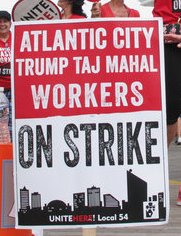 Of like kind is the Labour
Secretary in the new Trump
administration, Andrew Puzder, CEO of the fast food monopoly that
owns the Hardee's and Carl Jr.'s restaurant chains. Puzder
opposes minimum wage increases and rules on overtime and is
described as "anti-regulation." Puzder has said that policies
such as a minimum wage "encourage automation" and that his and
other fast food monopolies are investing to develop machines to
replace human labour.
Of like kind is the Labour
Secretary in the new Trump
administration, Andrew Puzder, CEO of the fast food monopoly that
owns the Hardee's and Carl Jr.'s restaurant chains. Puzder
opposes minimum wage increases and rules on overtime and is
described as "anti-regulation." Puzder has said that policies
such as a minimum wage "encourage automation" and that his and
other fast food monopolies are investing to develop machines to
replace human labour.
Trump's pick for Secretary of Commerce is Wilbur Ross, who has been given the moniker the "king of bankruptcy" and called a "savior of failing U.S. industries." His claim to fame is buying and "restructuring" bankrupt companies to then sell them off, minus any pension obligations to the workers, having extracted concessions from them under the blackmail of either "saving their jobs" or having nothing. Ross has taken this approach in textiles, mining and the steel industry and most recently has bought up hundreds of millions of dollars in energy company debt through his firm WL Ross & Co. in a bid to take control of struggling oil and gas companies if they are forced to hand over ownership to creditors.
The Wall Street Journal states that the market value of Ross's International Textile Group Inc., "a roll-up of bankrupt textile companies, has fallen to a few million dollars" and that Ross' "attempt to revive the U.S. textile industry has stumbled amid stiff competition from China." In 2004 Ross "joined with A.T. Massey Coal Co. to buy assets from bankrupt Horizon Natural Resources Co., using a combination of cash and debt," the Wall Street Journal says. Renamed International Coal Group, the company went on to buy up smaller coal producers and, in 2011, was sold to Arch Coal Inc. for $3.4 billion.
In steel, Ross is said to have "pieced together" bankrupt steel producers Bethlehem Steel, Acme Steel, Weirton Steel and LTV Steel to form International Steel Group in 2002. He then took the conglomerate public in 2003 and sold it to Indian billionaire Lakshmi Mittal two years later for $4.5 billion. Some 250,000 steelworkers had their pensions cut anywhere from 10 to 70 per cent.
For Your Information
Election Results
Electoral College voting for President of the United
States of America takes place December 19, when the 538 electors
(selected by the candidates and state Republican and Democrat
organizations) meet in their respective states and vote, on separate
ballots, for President and Vice President.[1] The new Congress counts
the electoral votes on January 6 and has to certify, or challenge, the
votes by each state’s electors. Federal law requires a member of both
the House and the Senate to question a state's electoral votes in
writing for a formal objection to be considered. On January 6, the
sitting Vice President, in this case Joe Biden, acting as President of
the Senate, chairs the session and declares which persons, if any, have
been elected President and Vice President. Inauguration of the next
President is scheduled to take place on January 20, 2017 at 12:00 noon.
Donald Trump, the Republican Party nominee has been
assigned
a majority of Electoral College votes -- 306 votes
to 232 for Hillary Clinton, the Democratic Party nominee -- based on
the presidential
election held November 8, making him the 45th President-Elect of
the U.S.[2]
Out of 232 million eligible voters, more than 95
million (41
per cent) did not cast a ballot. Three million are ineligible due
to their status as felons. Donald Trump received approximately 63
million votes, or 27 per cent of the eligible vote, fewer than
Clinton's
approximately 65 million votes that represent 28 per cent of the
eligible vote.[3]
Libertarian Party candidate Gary Johnson received 4 million
votes. Green Party candidate Jill Stein received more than 1
million votes. Other candidates and write-in votes accounted for
2 million votes, including candidates from the Party for
Socialism and Liberation, the Workers' World Party, the Peace and
Freedom Party and others, as well as independent candidates.
This was the fifth U.S. election in which the person with a plurality of the national vote did not win the Electoral College vote.
Elections also took place for the House of Representatives and Senate. In both cases Republican Party candidates won a majority of seats, 239 to 193 for the Democratic Party in the House and 51 to 48 for the Democratic Party in the Senate.
Information from Exit Polls
According to CNN exit polls, 54 per cent of voters had an unfavourable opinion of Hillary Clinton while 60 per cent had an unfavourable opinion of Donald Trump. Eighteen per cent found them "both unfavourable." Sixty-one per cent said Clinton is not "honest and trustworthy" while 63 per cent said the same about Trump. Twenty-nine per cent said neither is honest. Fifty-three per cent said they would be "scared" or "concerned" if Clinton won, while 56 per cent said the same about a Trump victory. Seventy per cent said Donald Trump's treatment of women bothered them "a lot" or "some." Forty-four per cent said they would be "excited" or "optimistic" by a Clinton victory while 40 per cent said the same about Trump.
Note
1. Electors who do not vote for the candidate who received a majority of votes in their state are known as "faithless electors" and in some states face criminal penalties, usually a small fine. In the past century this has only occurred a handful of times. Congress, on January 6, can overrule any actions by the Electoral College.
2. Trump was declared the winner in Alabama, Alaska, Arizona, Arkansas, Florida, Georgia, Idaho, Indiana, Iowa, Kansas, Kentucky, Louisiana, Michigan, Mississippi, Missouri, Montana, Nebraska, North Carolina, North Dakota, Ohio, Oklahoma, Pennsylvania, South Carolina, South Dakota, Tennessee, Texas, Utah, West Virginia, Wisconsin and Wyoming. Clinton was declared winner in California, Colorado, Connecticut, Delaware, District of Columbia, Hawaii, Illinois, Maine, Maryland, Massachusetts, Minnesota, Nevada, New Hampshire, New Jersey, New Mexico, New York, Oregon, Rhode Island, Vermont, Virginia and Washington.
3. In 2012, the Republican candidate
received 61 million votes to 66 million for the Democratic Party
candidate. In 2008, the total was 60 million votes for the Republican
candidate compared to 69 million for the Democratic
candidate.
(With files from 2016 National Popular Vote Tracker, United States Election Project, National Archives and Records Administration, CNN)
Positions of Trade Unions
One of the biggest problems facing the American working class and people is that the voice of the working class is effectively silenced. Not only are relatively few workers unionized -- the rate of unionization has slipped from 20 per cent in 1983 to 11 per cent today -- but the union centrals generally toe the line of the old politics of siding with one faction of the U.S. ruling class in its battle for power, which leaves the American working class divided. In this vein, the position of U.S. unions and the international unions based in the U.S. is to support the crisis-ridden U.S. democracy by saying that Trump's election represents the voice of the American people. Certain unions suggest that through the presidential election the people were given a chance to decide the direction of the country. They declare that this is what U.S. democracy is all about, to arrive at a verdict of the people. Within this, most admit that their union membership was deeply divided, claiming the division is a "left-right" ideological divide. They ignore the results which show that a large plurality of workers did not vote for either Clinton or Trump preferring instead not to participate in an election where the candidates of the Republicans and Democrats were generally considered "the two most unwanted."
Some unions have declared that the election results show that the economic and political system is broken, and are an indictment of the same old "politics as usual," yet they continue to yearn for "business as usual." An expression of this sentiment is the statement of the national organization representing a collective of unions, the AFL-CIO. Its President Richard Trumka says in a statement:
"Donald Trump has been elected president. America is a democratic nation, and the voters have spoken. The AFL-CIO accepts the outcome of this election and offers our congratulations to President-Elect Trump. More than anything, this election is an indictment of politics as usual."
According to the AFL-CIO, the people have spoken, yet the national vote count shows Clinton ahead by over 2 million votes. Trump's victory, it affirms, is largely due to angry workers facing the phenomena of growth without manufacturing, poor job creation, and U.S. jobs leaving the U.S., especially in what it calls the "rustbelt battlegrounds." It asserts the elites turned their backs on the workers, especially with the global trade agreements sending jobs overseas. This tipped the Electoral College vote in favour of Trump with victories in the heavily industrialized states of Pennsylvania, Ohio, Indiana, Wisconsin and even Michigan, all states the Democrats recently have won. The AFL-CIO does not explain or attempt to analyze how changing one elite oligarch for another elite oligarch could possibly favour the working class. It does not analyze why "angry workers" should vote for a virulently anti-worker oligarch such as Clinton, who is a promoter of sweatshops in Haiti, or Trump who personally has a vicious record of attacking his own hotel and casino workers.
The union central avoids any serious discussion of why the working people are not prepared to defend themselves in the face of the imperialist election or how to go forward in a manner that favours the interests of the workers and does not create illusions that Trump will do so. What role have the organized unions played in leaving the working class without an outlook that can provide it with a solid base from which to engage imperialist democracy and its electoral system in battle in good conscience and with actions with analysis?
Some union leaders look for continuity in their role within civil society even though Trump severely threatens them in practice at his hotels and casinos and in his speeches, which are laced with police state rhetoric.
Most U.S. union leaders heavily favoured Clinton and widely campaigned amongst their membership to vote for her. Canadian union members of international unions with headquarters in the U.S. even received form letters from the U.S. leaders exhorting them to vote for Clinton and asking them to challenge the groundswell of anti-Clinton sentiment from their own membership.
The unions recognized that many workers were divided when it came to voting, but failed to analyze that dividing the working class on a sectarian basis based on one or another of the oligarchic parties is precisely a main role of the outmoded institutions which do not empower the people. The sectarian split along party lines leaves the working class vulnerable to siding with this or that so-called right-wing and left-wing faction of the financial oligarchy up to participating in a reactionary civil war, which is seriously brewing in the United States. Embroiling the working class in the inter-monopoly and inter-imperialist politics of the oligopolies and financial oligarchy greatly weakens the working class movement as it obscures the underlying division in the U.S. between social classes, especially the class struggle between the working class and those who own and control social wealth and property such as the representatives of the oligopolies such as Trump and Clinton.
The International Brotherhood of Electrical Workers (IBEW) refers to a split between its leaders and some who followed them in voting for Clinton and other members who voted for Trump.
"This was a long, and at times, divisive, election, but as brothers and sisters in the IBEW, there remains much more that unites us than divides us, and it's more important now than ever that we work together over the coming days, months and years," a statement says.
But how to accomplish such unity and for what aim is not broached. Left unsaid is the need for independent politics of the working class organized of, for and by the workers themselves with their own worker politicians.
Instead, the IBEW says: "Last Tuesday revealed a deep anxiety among the electorate over a declining middle class, stagnant wages and the sense that our political system is rigged in favor of the top 1 percent."
A working class conscious of its independent politics would never leap from the difficulties it faces into the arms of the likes of Trump. Instead of arriving at warranted conclusions of the need to strengthen the organized front of the working class, the IBEW disgraces itself with words of conciliation which claim "common ground" between the workers and Trump.
"To the extent that President-Elect Trump is serious about working toward growing the middle class and providing real opportunities for working Americans, we're willing to work with him. On issues like trade, infrastructure, jobs and outsourcing, there can be common ground between us, and I'm committed to finding it," says IBEW President Lonnie R. Stephenson.
These issues are precisely those where Trump and his new cabinet, such as Wilbur Ross, appointed as Secretary of Commerce, have shown no common ground whatsoever with the working class. Why not conclude the obvious based on the reality that confronts the polity and deliberate on how workers will deal with that?
The effort of certain U.S. union leaders is now to find a niche where they can go back to conducting "business as usual" despite the elections and Trump's cabinet appointments showing that the U.S.election has plunged the U.S.-dominated imperialist system of states and the entire world into a situation where "business as usual" is no more.
The world exists as it presents itself, yet certain
union
leaders ostensibly representing the interests of the working
class appear to be looking for some "common ground" with the
Trump regime. They imagine some common ground
will emerge from Trump's pledge that he will change the situation
facing the angry workers of the heavily industrialized states.
The union leaders insist that Trump follow up on his promises and the
unions must show an ability to negotiate with the people with
whom they disagree. An example is the statement of the
International Association of Machinists and Aerospace Workers (IAMAW).
The IAMAW puts on a brave face and says:
"As a labor union, we deal with those whom we disagree with every day at the bargaining table. We try to find common ground. That's exactly what we intend to do in this new reality."
The common ground is said to be "jobs" and it is claimed that this is Trump's agenda as well. The unions seek common ground with Trump over "things" such as jobs but say they differ over "core values," which they will not compromise. Presumably jobs and core values are unrelated. Totally ignored is the fact that Trump's aim and that of the workers are diametrically opposed to one another. For Trump, jobs are things not workers with rights and class interests in contradiction with those who own and control social property.
Here, many U.S. union leaders say they face a dilemma and must make use of their negotiating ability to find common ground between jobs and their "core values," on which they will never compromise. In this dilemma, "jobs" and their creation are presented as things, not relations people enter into to make a living and from which the oligarchs can seize the added-value workers produce. Because jobs are considered things and not relations amongst people, in particular between employees and employers, the union leaders present these things without concrete core values based on the rights of the working class and its wish for equilibrium in class relations. Jobs are considered "just jobs" without ideology, without politics of any kind, without even class struggle in defence of rights, without the reality that under imperialism, jobs exist within an antagonistic dialectical social relation between the working class and those who own and control social wealth such as Trump and Clinton. Within the difficult social relation, the working class fights for equilibrium that at least recognizes its rights and prepares itself for an opening towards building the new outside the social relation.
The direction Trump -- or Clinton for that matter -- takes the economy and whom it serves, according to many union leaders, is not germane to the relations between them and the Trump presidency as long as jobs are created, and their "core values" are respected at least generally in words if not in deeds in the hurly burly world of class struggle. The core values remain disconnected from reality and without historical context within the imperialist system of states and certainly not connected with the concrete conditions of working class struggles in defence of their rights and the rights of all.
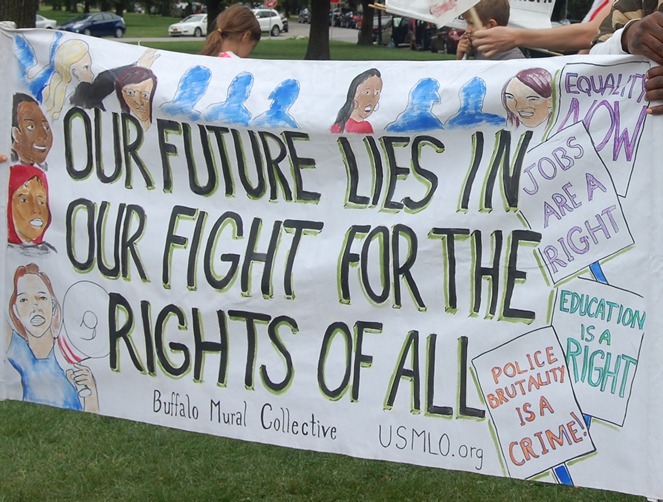 Some union leaders say they
recognize the split between
themselves, who campaigned and voted for Clinton along with some
members, and other members who voted for Trump. Again, no heed
seems to be paid to those who did not vote at all and why people
vote the way they do or do not vote. The vote is presented as
occurring without historical context and without consideration of
the many people who participated in actions with analysis to
oppose the imperialist elections and their fraudulent electoral
process as best they could and are searching for an
alternative.
Some union leaders say they
recognize the split between
themselves, who campaigned and voted for Clinton along with some
members, and other members who voted for Trump. Again, no heed
seems to be paid to those who did not vote at all and why people
vote the way they do or do not vote. The vote is presented as
occurring without historical context and without consideration of
the many people who participated in actions with analysis to
oppose the imperialist elections and their fraudulent electoral
process as best they could and are searching for an
alternative.
The results of the election show that the very large majority directly voting against Trump together with those not voting number more than 170 million. What this majority holds in common is that its decision to oppose Trump or oppose the entire imperialist electoral process does not count in the U.S. political system. They are disenfranchised from the result, which is a Trump presidency with all the power that entails. The working people are disempowered locally, regionally and nationally.
The vote does not signal a common ground between the working people and the financial oligarchy. If anything it signals a repudiation of an imperialist electoral process that produced such unwanted pro-war, racist candidates. Why not conclude that and deliberate on how workers are to organize themselves as a powerful front capable of defending their rights with actions with analysis, and which constantly builds workers' consciousness of themselves and their unity in the struggle for a new pro-social direction for the economy and society.
Increase of Civil War Scenarios
The contradictions in the United States between those asserting state's rights and those imposing federal powers and the prerogatives of authorities at various levels are so sharp that civil war scenarios are unfolding at a rapid rate. Especially since the election of Donald Trump to the presidency, this and that authority are declaring they will refuse to follow his command on issues such as immigration, deportations, policing and even military operations abroad. Los Angeles police have stated they will not cooperate with federal forces on immigration matters, as have New York City Mayor Bill de Blasio and Chicago Mayor Rahm Emanuel. Various officials from what are called sanctuary cities, like Boston, Philadelphia, San Francisco and Seattle have said the same.[1]
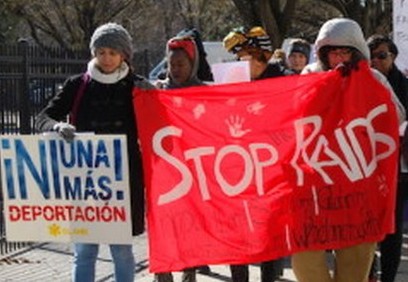 Recently, referring to
Trump's statement about massive
deportations, New York Governor Cuomo said he will protect people
from racism and discrimination. New York is notorious for
state-organized racist attacks yet Cuomo is now attempting to
paint the state as opposing discrimination. He is also doing so
in a manner that directly challenges the federal government.
Recently, referring to
Trump's statement about massive
deportations, New York Governor Cuomo said he will protect people
from racism and discrimination. New York is notorious for
state-organized racist attacks yet Cuomo is now attempting to
paint the state as opposing discrimination. He is also doing so
in a manner that directly challenges the federal government.
In an open letter to all students across the state, Cuomo said, "After the harsh and ugly rhetoric of the campaign, many of you are concerned about what might happen next. Let me be clear: This is the State of New York, not a state of fear. We will not tolerate hate or racism." He goes on, "As long as you are here, you are New Yorkers. You are members of our community, and we will stand up for you." He emphasizes that New York has strict laws against "hate crimes" that will be enforced. A special hotline has been established to report incidents of discrimination. Cuomo again repeats, "Our responsibility is to protect all who are here, whether native-born or immigrant, whether documented or not."
Two things are particularly significant here. One is Cuomo's statement that "As long as you are here, you are New Yorkers." He does not say residents of New York, or that you are New Yorkers and Americans, but simply New Yorkers. Why such emphasis? Given that it is known that New York policing agencies are all used to enforce government racism and discrimination, it cannot be seen as a defence of rights. Rather, it is more an assertion that he may use these police forces against federal agencies. It is not rights that he will protect, as his many actions as Governor against rights indicate, but rather his authority as Governor in relation to the authority of the federal government.
Cuomo further indicates this when he says he will protect all who are here in New York, whether documented or not. This sounds like a direct challenge to Trump, with his calls to target undocumented immigrants. It has the appearance of "protecting" the undocumented, when in reality it has more to do with asserting his powers as Governor while also making it appear the government can be relied on to oppose discrimination. Cuomo, like the Mayor of New York City who made similar comments, is using the substantial armed forces at his disposal to back up whatever negotiations are to take place with the federal power. It is a dangerous game that the people need to take into account when they wage resistance struggles.
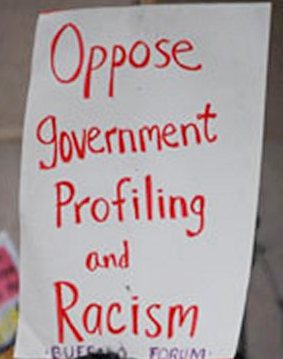 The notion promoted by some that
the problem of
state-organized racism lies solely with Trump, while state-level
governments can be relied on to protect the people is dangerous
indeed. Cuomo, as a representative example, is coming forward in
the context of various individual acts of a racist nature that
have occurred, particularly on campuses. While these acts are
widely promoted by media, the same media are generally quiet
about the broad and united response against these attacks by
students across the state. Similarly, the various organizations
taking actions, long before and since the Trump election,
including those that bring Muslims and Jews together to defend
rights, are not given recognition. For every one act there are
dozens and dozens of actions in support of the individuals or
mosques targeted. Cuomo's stand at once opposes the stand of the
people in defence of the rights of all, by giving the appearance
that it is sections of the people who are racist and the
government can be relied on to protect the people, while trying
to unite the people to oppose the incursions of the federal
power.
The notion promoted by some that
the problem of
state-organized racism lies solely with Trump, while state-level
governments can be relied on to protect the people is dangerous
indeed. Cuomo, as a representative example, is coming forward in
the context of various individual acts of a racist nature that
have occurred, particularly on campuses. While these acts are
widely promoted by media, the same media are generally quiet
about the broad and united response against these attacks by
students across the state. Similarly, the various organizations
taking actions, long before and since the Trump election,
including those that bring Muslims and Jews together to defend
rights, are not given recognition. For every one act there are
dozens and dozens of actions in support of the individuals or
mosques targeted. Cuomo's stand at once opposes the stand of the
people in defence of the rights of all, by giving the appearance
that it is sections of the people who are racist and the
government can be relied on to protect the people, while trying
to unite the people to oppose the incursions of the federal
power.
The racist states at both the federal and state levels are responsible for the broad racism and discrimination against the people, such as racist mass incarceration and segregated schools and neighborhoods. This is also apparent from the ongoing police killings and brutality and continued government targeting of Muslims at home and abroad. The Justice Department investigations of 17 police departments confirmed widespread discrimination and unjust use of force, but have done nothing to stop these injustices.
The resistance from state and local forces that Trump is facing in regards to immigration and policing are an indication of the difficulties the imperialist rulers face in imposing their dictate. The various authorities are all contending for power and Trump may not be so successful in uniting them, especially considering the various mayors have huge police forces of their own.
The centralization of police powers in the hands of the presidency is in part designed to avert civil war by either unifying and/or destroying various policing agencies to end the competition in their ranks. It highlights a main problem the imperialist rulers face. Keeping the Republic united is the responsibility of the president, charged with preserving the U.S. state. Various recent police actions, including those at Standing Rock where many police from different states and National Guard were brought together to repress resistance, are part of such efforts. All of it is done in the name of Making America Great Again.
Trump's appointment of Alabama Senator Jefferson Beauregard Sessions -- named after the President of the Confederacy Jefferson Davis and Confederate General Pierre Gustave Toutant-Beauregard -- to be Attorney General in his cabinet also represents an effort to unify forces among the rulers in the north and south in conditions where civil war scenarios are already evident. Trump's means to do this is to openly embrace those known to support the slave-power of the south. It remains to be seen if this will be successful.
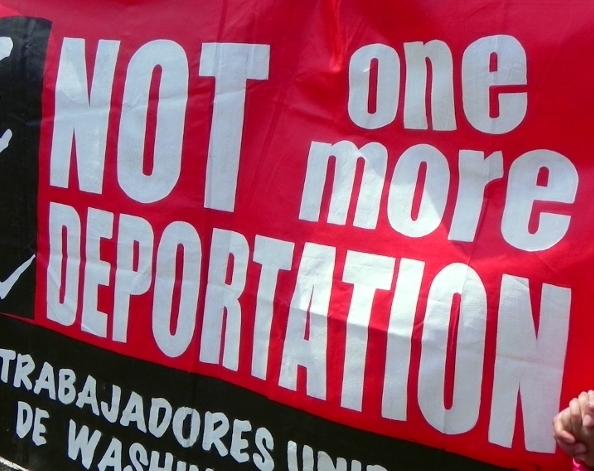 Sessions has also voiced
support for Trump's plans to quickly
begin deporting immigrants and to do so even more rapidly than
Obama has done. Immigration is one of the areas where the
executive can act with broad impunity and take action without
Congress.
Sessions has also voiced
support for Trump's plans to quickly
begin deporting immigrants and to do so even more rapidly than
Obama has done. Immigration is one of the areas where the
executive can act with broad impunity and take action without
Congress.
Trump and Sessions are also backing expansion of the previous government registry, known as the National Security Entry-Exit Registration System (NSEERS). It targeted non-citizens living legally in the U.S. as well as those entering legally, many with student visas, from 25 Asian and African countries, many mostly Muslim, including Afghanistan, Egypt, Iran, Iraq, Lebanon, Libya, Sudan, and Syria. It existed from 2002-2011, with portions of it still in place, including a giant biometric database of registrants, used by the many policing agencies at all levels.
The use of a special registry is not a Trump invention. It is part of the direction of governance towards one of police powers that has been developing and that Trump seeks to build on and expand. It is also a means to bring the various agencies involved together, in the name of national security. Such registries and plans more broadly for biometric ID for immigrants, then all workers, are also means by which to criminalize the workforce and enable the imperialist rulers to more readily impose their government of police powers. These are among the reasons that stepping up the broad resistance to all such measures is critical.
Note
1. In the wake of Trump's renewed threats of mass deportations following his election, mayors of several "sanctuary cities" explicitly stated that they will not be changing their policy of non-cooperation with the federal government on immigration matters. These include New York City Mayor de Blasio, Chicago Mayor Emanuel and Seattle Mayor Ed Murray. As president, Trump says he will cut off federal funding to any cities that do not assist in deportations.
Across the U.S. there are some 31 cities referred to as sanctuary cities. While not a formal designation, the term indicates that either by law or by practice, local law enforcement officials do not cooperate with the federal agency Immigration and Customs Enforcement (ICE). Non-cooperation with ICE varies from place to place, and may be for pragmatic reasons that have nothing to do with taking a stand for rights, for example to avoid lawsuits from those unjustly incarcerated. Law enforcement in some cities will only turn over suspects to ICE if they are charged with major crimes.
Mayor De Blasio said that by year-end, New York City will delete from its database the names of hundreds of thousands of undocumented immigrants who have received a city ID card, so they cannot be identified or deported.
Los Angeles Police Chief Charlie Beck said on November 14 that the force would not change its policy, in place since 1979, that bars officers from contacting people solely to investigate whether they are in the country legally. Under Chief Beck, the department has also stopped bringing suspects for minor crimes to federal authorities. Similarly, Denver Police spokesman Doug Schepman said in a statement, "Immigration enforcement is handled at the federal level, not by local law enforcement. The Denver Police Department has not participated in those enforcement efforts in the past and will not be involved in the future."
This situation raises the possibility of a clash between major U.S. cities, such as New York, Los Angeles and Chicago, whose massive police forces are increasingly militarized, and ICE, which like other federal agencies has also been increasingly militarized.
(With files from Voice of Revolution, Buffalo Forum and news agencies)
Eliminating the Human Factor/Social Consciousness
Following the election in the United States, much time was spent expressing the shock of the Clinton camp at the Trump victory. Time and again, reference was made to Hillary Clinton's superior "ground game" which it was presumed would prevail over Donald Trump's "weak ground game." Clinton's "ground game" was the organization put together in states her campaign identified as key and areas within those states called Designated Market Areas (DMAs) -- the trademark name used by Nielsen Media Research to identify TV stations that best reach an area and attract the most viewers.[1] These "DMAs" were identified as crucial for Clinton to win. The impression was created that as the Democratic Party candidate, Clinton had legions of volunteers and strong organizations as well as money but, despite this she still lost. Some also now claim that she lost due to her campaign not "field testing" its decisions and following what was happening "on the ground" and that her campaign deployed its "ground game" to the wrong places.
 This is meant to cover up
the fact that the "U.S. system of
elections, political parties and governance is exhausted," as TML
Weekly pointed out just before the election. The
elections, "far from re-establishing a new equilibrium within the
status quo, are being used to complete the process of 'change'
towards ways of governing which bypass political parties and
government structures." In fact, elections are being used to
bring in government of
police powers to replace government of laws.
This is meant to cover up
the fact that the "U.S. system of
elections, political parties and governance is exhausted," as TML
Weekly pointed out just before the election. The
elections, "far from re-establishing a new equilibrium within the
status quo, are being used to complete the process of 'change'
towards ways of governing which bypass political parties and
government structures." In fact, elections are being used to
bring in government of
police powers to replace government of laws.
In this regard, the U.S. presidential election is also an example of the destruction of political parties, which is one of the salient features of the crisis of the system called representative democracy. This, in turn, destroys any participation of members of the polity in governance. Once political parties cease to function as primary organizations, the link is also broken between the governed and those whom they entrust to represent them in government. To speak of citizen participation in governance is meaningless. Furthermore, there can be no equality in a system based on privilege where the only role given to "we the people" is to hand over all decision-making to a select few. In the United States, as well as Canada, Britain and all other countries which adopted the same electoral system, the process was designed in such a manner that "we the people" only have a role to play during an election. Membership in a political party was supposed to be the link between the individual member of the polity and the political power through which the individual members of the polity were supposed to have a say over the candidates and representatives and the vision they and their party put forward for the country.
This link to political parties was always a way to preserve the class rule of the property owners and, since the turn of the 19th to the 20th centuries, its elitist nature to serve the very rich and preserve privilege became evident, especially once universal suffrage was won by the people. During the 20th century the form served the monopolies and today it has been usurped by the oligopolies, which have taken over governments and thus control the political process and electoral systems.
The way in which the recent election campaign was carried out in the U.S. reveals a vicious struggle for power within the factions of the ruling class conducted by powerful oligopolies. Its aim to prevent anyone from thinking and acting as part of a political movement of the people which changes things in their favour was also paramount.
The Clinton Campaign
The Clinton campaign strategy was based on public and private data brought together into a sophisticated database and an algorithm called Ada -- named for 19th-century mathematician Ada, Countess of Lovelace[2] -- which, news sources report, "spit out what the campaign should do, in particular where to focus their resources."
An article in the Washington Post by John Wagner provides the following information:
Ada is a complex computer
algorithm said to play a
role in
virtually every strategic decision Clinton aides made, including
where and when to deploy the candidate and her battalion of
surrogates and where to air television ads -- as well as when it
was safe to stay dark.
The campaign's deployment of other resources -- including county-level campaign offices and the staging of high-profile concerts with stars like Jay Z and Beyoncé -- was largely dependent on Ada's work, as well.
While the Clinton campaign's reliance on analytics became well known, the particulars of Ada's work were kept under tight wraps, according to aides. The algorithm operated on a separate computer server than the rest of the Clinton operation as a security precaution, and only a few senior aides were able to access it.
According to aides, a raft of polling numbers, public and private, were fed into the algorithm, as well as ground-level voter data meticulously collected by the campaign. Once early voting began, those numbers were factored in, too.
What Ada did, based on all
that data, aides said, was
run
400,000 simulations a day of what the race against Trump might
look like. A report that was spit out would give campaign manager
Robby Mook and others a detailed picture of which battleground
states were most likely to tip the race in one direction or
another -- and guide decisions about where to spend time and
deploy resources.
[...] Clinton aides were
convinced their work, which
was far
more
sophisticated than anything employed by President Obama or GOP
nominee Mitt Romney in 2012, gave them a big strategic advantage
over Trump.
[...]
Aides say Pennsylvania was pegged as an extremely important state early on, which explains why Clinton was such a frequent visitor and chose to hold her penultimate rally in Philadelphia on Monday night [November 7]."
[...] the importance of
other states Clinton would
lose
--
including Michigan and Wisconsin -- never became fully apparent or
that it was too late once it did.
Clinton made several visits to Michigan during the general election, but it wasn't until the final days that she, Obama and her husband made such a concerted effort.
The Trump Campaign
On November 16, Fox News interviewed the Trump campaign's digital director Brad Parscale in which he explains his role in Trump's campaign. Parscale is a partner in the marketing firm Giles-Parscale. According to his company's website, Parscale "creates web marketing strategies and oversees all technical and functional aspects of these strategies."
He indicates in the interview that Donald Trump's children, Ivanka and Eric Trump, had originally hired him for their real estate website. "Once I got the real estate website then I started to work my way through the Trump [organization]." Parscale said that at present he has "a very good relationship with them. I mean, they value hard work, they value loyalty, they value success."
Parscale claims that based on his work he was "95 per cent sure" that Trump would win. His data operation ran everything from "TV buying to where we were on the ground to all of the different operations. And so, and having that data right there, we could start to where the persuadable targets are, [Get Out the Vote] … everything we needed to know," he said.
He gave the example of Pennsylvania and Michigan: "We played in some other spots also as I started to see data and started to track it. We were making thousands of live calls, web tracking, web different surveys and it was building and it's building what's called models and universes. What we can start to see is, we're in play in Pennsylvania and play in Michigan. Let's buy in these areas. Let's buy these DMAs. Let's buy these voter targets. We started to see that move our direction. And by the Friday before the election, I had predicted that we were going to win 305 electoral results."
"The [advanced] ballots in early voting... [were] showing the data that where we were hitting targets and where we've wanted to see the voters turn out were showing up for us.
"[...] the data doesn't lie. And that is the beauty of
our
data.
I had some great data scientists, we have teams of them putting
that data in a way that could be consumed so we could understand
where we need to target people.
[...]
"My one flip mistake was Wisconsin and Colorado. That's my 305 or 306. However as you can see our media buys from where we bought them in Pennsylvania and ... different ways we're doing, we had a good strategy with the data."
Asked about the effect of the FBI director's intervention in the campaign, announcing a further investigation of the Clinton e-mail scandal he said: "[...] I was actually flying with Mr. Trump that night. I showed him plenty of the numbers before that announcement that we were already coming. Those undecideds are moving our way. [...] People in this country were ready for change, they are ready for something new. They were already moving that way."
Also asked about the effect of the "Access Hollywood tape" which revealed Trump talking about groping women, he said, "All campaigns have ebb and flows along the way, right? Ups and downs. I mean, the progress that reassess your data, remove and build new universes that now we have new targets. So, you move, you're in the bag, you move the people in and out.
[...]
"My goal is to be a megaphone for people, for businesses, for candidates, for who that is," Parscale said. Referring to the mistakes of the Republican campaigns in the past he says: "I think that science that was missed in the previous campaigns was to take the digital, and mix TV, ground game, door knocking, all of those people, even budget. Jared [Kushner, Ivanka Trump's husband] and I oversaw where the budget data was."[3]
"You shouldn't give all of this away. You should hold some of it inside so you can make more money doing it for others," Parscale concluded.
Comparisons Between the Trump and Trudeau Campaigns
Speaking to a conference of the Canadian Chapter of the International Institute of Communications on November 17, the Trudeau Liberals' chief "digital strategist" Tom Pitfield indicated that his impression was that the Trump campaign was run in the same manner as Trudeau's.
"My general impression is that President-Elect Donald Trump ran a very similar campaign to what we did with Trudeau for probably a lot of the same reasons. We did not have the pools of data that were available to the other parties at the time, so we had to go out on our own to find it.
"And in doing that, we had to have honest and engaged conversations with people to get consent, to interact with them, which meant our data was better, it was fresher -- it was more current."
Pitfield argued that Hillary Clinton, in contrast to Trump and Trudeau, ran an "offline campaign" that probably relied too heavily on traditional media.
"I think it started more (for Trump) as a fluke than by deliberate intent. I would guess that Hillary's camp had bought all the prime television spots," he said.
"He had to respond he went to social (media) and as a result discovered in that process all the advantages that come from running an online campaign. So, in fact, I'd argue that Hillary and her team won the offline campaign. The data coming in now is that, without question, Trump dominated the online campaign."
"It allowed, from a data perspective, for people to do intervention testing, so -- not that I want to get into the details -- but when you run a campaign like Hillary, you have the same thing all the time. You don't really learn anything about the people you're appealing to because you're cookie-cutter," Pitfield said.
"When you have a candidate like Trudeau or Trump -- who rocked the boat and who are brave enough to say what they think -- it creates these moments where you can see how the baseline is measured against changes. And those changes are invaluable -- you know when to deploy resources more efficiently, you know how to deliver a message, you know how this resonates with the people you're talking about and how that insight is far more efficient."
Paying lip service to some sort of connection between such an election campaign and human beings, Pitfield claimed that the "change narrative" only works coming from a "credible candidate."
Notes
1. A DMA region is a group of counties that form an exclusive geographic area in which the home market television stations hold a dominance of total hours viewed. There are 210 DMA regions, covering the entire continental United States, Hawaii, and parts of Alaska. The DMA boundaries and DMA data are owned solely and exclusively by the Nielsen Company.
The Nielson Company says: "We study consumers in more than 100 countries to give you the most complete view of trends and habits worldwide. And we're constantly evolving, not only in terms of where we measure, or who we measure, but in how our insights can help you drive profitable growth."
2. Augusta Ada King-Noel, Countess of
Lovelace (December 10, 1815 - November 27, 1852 -- age 36), daughter of
the
poet Lord Byron, was an English mathematician and writer, chiefly
known for her work on Charles Babbage's early mechanical
general-purpose computer, the Analytical Engine. Her notes on the
engine include what is recognized as the first algorithm intended
to be carried out by a machine. As a result, she is often
regarded as the first computer programmer.
3. Jared Kushner is the son of
U.S. billionaire real estate
developer Charles Kushner. He
took over duties as CEO of Kushner Companies in 2008. Kushner is the
owner of the
newspaper the New York Observer and is credited with developing
Trump's digital
media campaign. Media report that Kushner is a "confidant" of Trump and
a close advisor
during the transition.
Bot Use in the U.S. Election
Studies and media reports before and after the November 8 presidential election point to an unprecedented use of social media robots known as "bots."
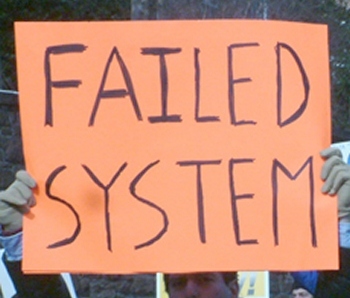 A November 1 article in The
Atlantic
states that in the
election
"the size, strategy, and potential effects of social automation
are unprecedented -- never have we seen such an all-out bot war." The
Atlantic reports that while in the final debate,
Trump
and Clinton readily condemned Russia for attempting to influence
the election via cyber-attacks, "neither candidate has mentioned
the millions of bots that work to manipulate public opinion on
their behalf." Researchers in the field who are part of the
Project on Computational Propaganda of the Oxford Internet
Institute at Oxford University indicate that "the U.S.
election saw perhaps the most pervasive use of bots in attempts
to manipulate public opinion in the short history of these
automated political tools." Recent findings of the Project on
Computational Propaganda's work can be found at politicalbots.org.
A November 1 article in The
Atlantic
states that in the
election
"the size, strategy, and potential effects of social automation
are unprecedented -- never have we seen such an all-out bot war." The
Atlantic reports that while in the final debate,
Trump
and Clinton readily condemned Russia for attempting to influence
the election via cyber-attacks, "neither candidate has mentioned
the millions of bots that work to manipulate public opinion on
their behalf." Researchers in the field who are part of the
Project on Computational Propaganda of the Oxford Internet
Institute at Oxford University indicate that "the U.S.
election saw perhaps the most pervasive use of bots in attempts
to manipulate public opinion in the short history of these
automated political tools." Recent findings of the Project on
Computational Propaganda's work can be found at politicalbots.org.
What Are Bots?
A bot is software that automates online tasks. They are used for commercial purposes and also increasingly by political campaigns. In the latter case, bots refer primarily to software that automates social media profiles and their interaction. They operate accounts presenting as real people, produce content, and interact with real users. Bots on social media platforms are designed to to rapidly deploy messages, replicate themselves, and pass as human users.
Bots are easily programmable through the Twitter application programming interface (API) and can be deployed by anyone with basic coding knowledge. Their use in political campaigns is referred to as "automated propaganda" or "computational propaganda."
Governments, militaries, candidates and their marketing agencies use bots for everything from creating fake accounts that attack individuals, directing followers to "fake news" and manipulating and distorting online polls to artificially inflating social-media traffic and the popularity of individuals or campaigns.
Whereas one person could produce, at best, several hundred messages on social media sites per day, bots can tweet, for instance, thousands upon thousands of times. These efforts drive up the numbers surrounding particular conversation elements on social media, making them spread further, "going viral" or "trending."
Bots are also linked through what are called "botnets" or networks of bots. These are bot-controlled social media accounts that are connected to one another and built to message and follow one another. They can be comprised of hundreds of unique accounts but can be controlled by one user from a single computer. They can be used to carry out coordinated attacks against individuals.
Researchers indicate that "political bots tend to be developed and deployed in sensitive political moments when public opinion is polarized."
Bot Use in the U.S. Election
The s
The authors indicate that the use of automated accounts was deliberate and strategic throughout the election. They emphasize that bots attacking the Clinton campaign were more sophisticated and targeted than those which targeted the Trump campaign.
The research team concluded that more than a third of pro-Trump tweets and nearly a fifth of pro-Clinton tweets between the first and second presidential debates came from automated accounts, which produced more than 1 million tweets in total.
One pro-Trump bot, @amrightnow, had more than 33,000 followers and spammed Twitter with "anti-Clinton conspiracy theories." It generated 1,200 posts during the final debate.
@loserDonldTrump retweeted all mentions of @realDonaldTrump that include the word loser -- producing more than 2,000 tweets a day.
The study found that for the first two presidential debates, pro-Clinton bots were outnumbered by pro-Trump bots four-to-one. By the final debate, that gap had widened to seven pro-Trump bots for every pro-Clinton bot.
It also found that during waking hours, highly-automated accounts were generating between 20 and 25 per cent of the traffic on Twitter about the election during the days leading up to the vote.
The authors note that the pace of automated political campaigning dropped off after Election Day -- "a reminder that campaigners and programmers behind bot accounts often disable their purpose-built automation on victory."
The findings were based on a collection of about 19.4 million Twitter posts gathered in the first nine days of November. Tweets were selected based on hashtags[2] identifying certain subjects and identified automated posting by finding accounts that posted at least 50 times a day. These accounts are described as bots that are "either irregularly curated by people or actively maintained by people who employ scheduling algorithms and other applications for automating social media communications."
"For example, the top 20 accounts, which were mostly bots and highly automated accounts, averaged over 1,300 tweets a day and they generated more than 234,000 tweets," the researchers note. "The top 100 accounts, which still used high levels of automation, generated around 450,000 tweets at an average rate of 500 tweets per day." They also note that they expect the actual number of bots to be much higher; many bots, after all, are built to avoid obvious methods of identification.
The researchers note that as the election continued the extent and sophistication of bot use increased, especially bots operating against Clinton or for Trump. They say, for example, that pro-Trump hashtags were inserted into more and more combinations of "neutral and pro-Clinton" hashtags, such that by the time of the election fully 81.9 per cent of the highly automated content involved some pro-Trump messaging.
They add that automated accounts tweeting with pro-Clinton hashtags also increased their activities over the course of the campaign period but never reached the level of automation behind pro-Trump traffic.
On August 4, Vanity Fair author Nick Bilton wrote about Trump's claims of having over 22 million Twitter followers, asserting that many of them were in fact bots. He wrote, "According to the site Status People, which tracks how many Twitter accounts are bots, inactive, or real, only 21 percent of Trump's Twitter followers are real, active users on the platform. The rest are either bots, dead bots, or real people who no longer log into Twitter."
Bilton also reported on bots used to ridicule Trump: "One example of such a bot was created by Brad Hayes, a roboticist and artificial-intelligence researcher at the Massachusetts Institute of Technology, who runs a bot called @DeepDrumpf. This fun little bot, which has 22,000 mostly real followers, uses a neural network that has been trained to tweet based on past transcripts from the real Trump. Just by looking at a couple of examples, the @DeepDrumpf bot shows how easy it is to make something sound real, or at least like a real Trump sound bite, even though it's completely fake. One tweet, in reply to Ted Cruz, notes, 'If I get elected president, believe me folks. I will bring unbelievable aggression. I bring that out in people. @tedcruz #Trump2016.' Another tweet reads: 'I can destroy a man's life by firing him over the wall. That's always been what I'm running, to kill people and create jobs.'"
Hillary Clinton's presidential campaign, Hillary for America, built a bot to text users Trump's quotes on selected topics. People who signed up to "Text Trump" received messages in a style intended to mimic Trump, asking them to question [the bot] on topics such as the economy, Hillary Clinton or China. When it responded with quotes from Trump himself, users could type "Source," and receive video or text evidence that Trump had said those things.
Although much emphasis is being placed on the use of
bots on Twitter, especially "pro-Trump" bots, their use against Trump
has been less publicized. For example, U.S. author Sasha Issenberg was
interviewed by the Liberals' chief data strategist for the 2015 federal
election, Tom Pitfield, at a December 14 event, "What Just Happened?
Inside the 2016 U.S. Election," hosted by neo-liberal think-tank Canada
2020. Issenberg noted that in past elections the Obama campaign had a
system whereby its supporters would give access to their Facebook
account to the campaign which would then, using a bot based on an
algorithm, indicate who they should contact and how (through social
media, phone calls etc.) based on merging this data with voter
registration data for what were identified as battlegrounds and user
profile information. Issenberg noted that this would encourage
supporters to interact with people who they might not otherwise talk to
about "politics," all directed by algorithm.
The November 1 article in The Atlantic quotes two of the Oxford study's authors. Samuel Woolley and Douglas Guilbeault write that bots "silence people and groups who might otherwise have a stake in a conversation. At the same time they make some users seem more popular, they make others less likely to speak. This spiral of silence results in less discussion and diversity in politics. Moreover, bots used to attack journalists might cause them to stop reporting on important issues because they fear retribution and harassment."
In an October 19 article in the Washington Post titled, "One in four debate tweets comes from a bot. Here's how to spot them," Caitlin Dewey writes: "Bots aren't attempting to change hearts and minds -- that's an ambitious task for a bit of code. Instead, most bots exist simply to muddy the facts, making it difficult for neutral bystanders to discern the truth and easier for partisans to reject any views that may clash."
Paraphrasing Philip Howard, another of the Oxford study's authors, Dewey says, "Bots, particularly pro-Trump bots, tend to circulate links to persuasive conspiracy sites -- often, they're the primary force keeping these links in circulation. In fact, Trump bots tend to be more sophisticated than Clinton ones, utilizing hashtags and including pictures that make them more persuasive.
"During the first debate, pro-Trump bots focused on Clinton's email scandal and Benghazi; during the second, they honed in on the whole 'I'll-send-her-to-jail' thing. Pro-Clinton bots, meanwhile, spread a number of messages about Trump's taxes during the first debate, and pivoted to his treatment of women in the second."
Quoting Howard, she writes, "In 2008 and even 2012, Twitter bots were used to make someone seem more popular. Now they're more about keeping negative messaging, misinformation, suspicion and even hate speech alive."
Notes
1. Bence Kollanyi, Philip N. Howard, and Samuel C. Woolley. "Bots and Automation over Twitter during the U.S. Election." Data Memo 2016.4. Oxford, UK: Project on Computational Propaganda, www.politicalbots.org.
2. A hashtag is a comment or statement that begins with the pound sign (#) that users add to their social media posts so that all those interested in the topic that hashtag refers to can follow it. Users generally see social media posts that have been re-posted by others, or liked or commented on by other users. This is done using social media sites' algorithms which boost popular content further.
December 26, 1862
The Past in the Present
On December 26, 1862, President Abraham Lincoln ordered the public hanging of 38 Sioux for demanding food for their starving people in a concentration camp. The youngest hanged was a 12 year-old girl.

Saint Paul, Dec.
27, 1862. I have the honor to inform you
[President Lincoln] that 38 Indians ordered by you for execution
were hung yesterday at Mankato [Minnesota] at 10 a.m. Everything
went off quietly. The other prisoners are well secured.
Website: www.cpcml.ca Email: editor@cpcml.ca

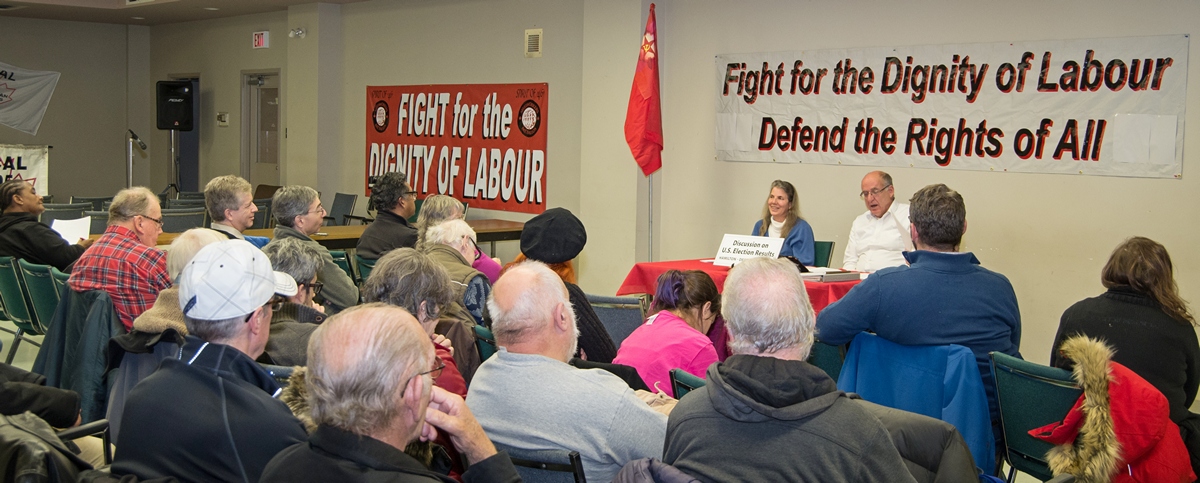
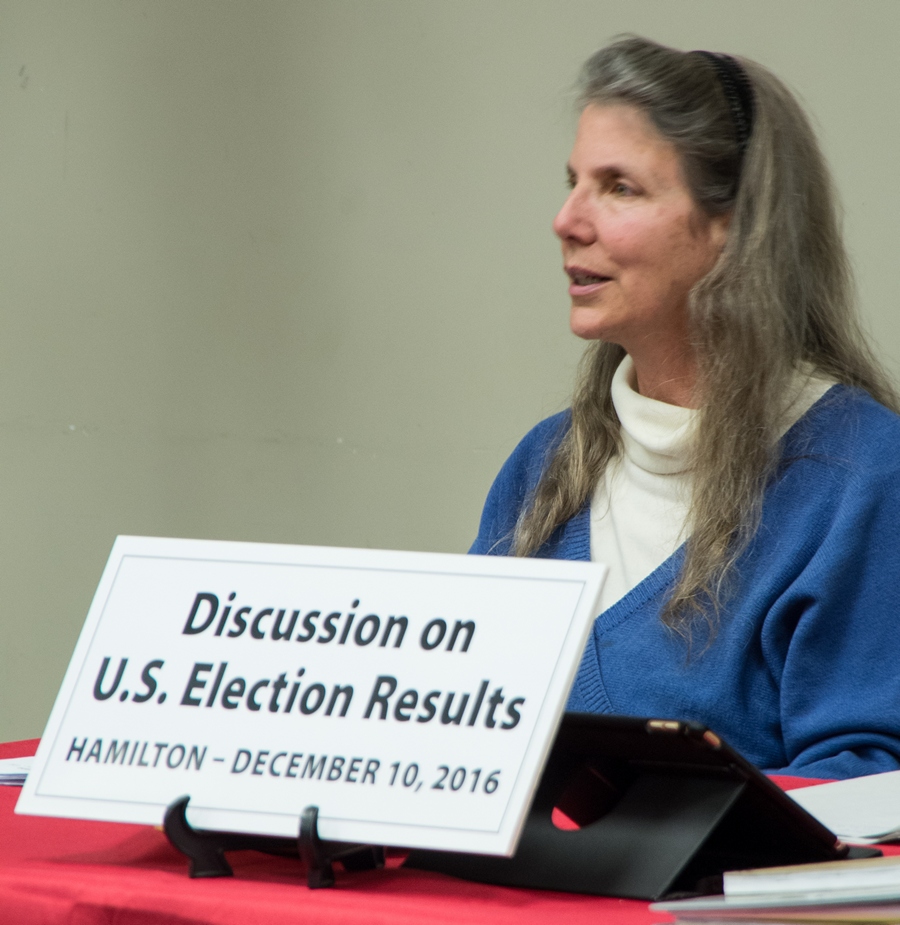 In Hamilton, the main
presentation, by Kathleen Chandler,
focused on this government of police powers that has increasingly
taken hold in the U.S., and the need for the people's forces to
take up the discussion and elaboration of what it means to
establish an anti-war government. Her presentation is reprinted
in full below.
In Hamilton, the main
presentation, by Kathleen Chandler,
focused on this government of police powers that has increasingly
taken hold in the U.S., and the need for the people's forces to
take up the discussion and elaboration of what it means to
establish an anti-war government. Her presentation is reprinted
in full below.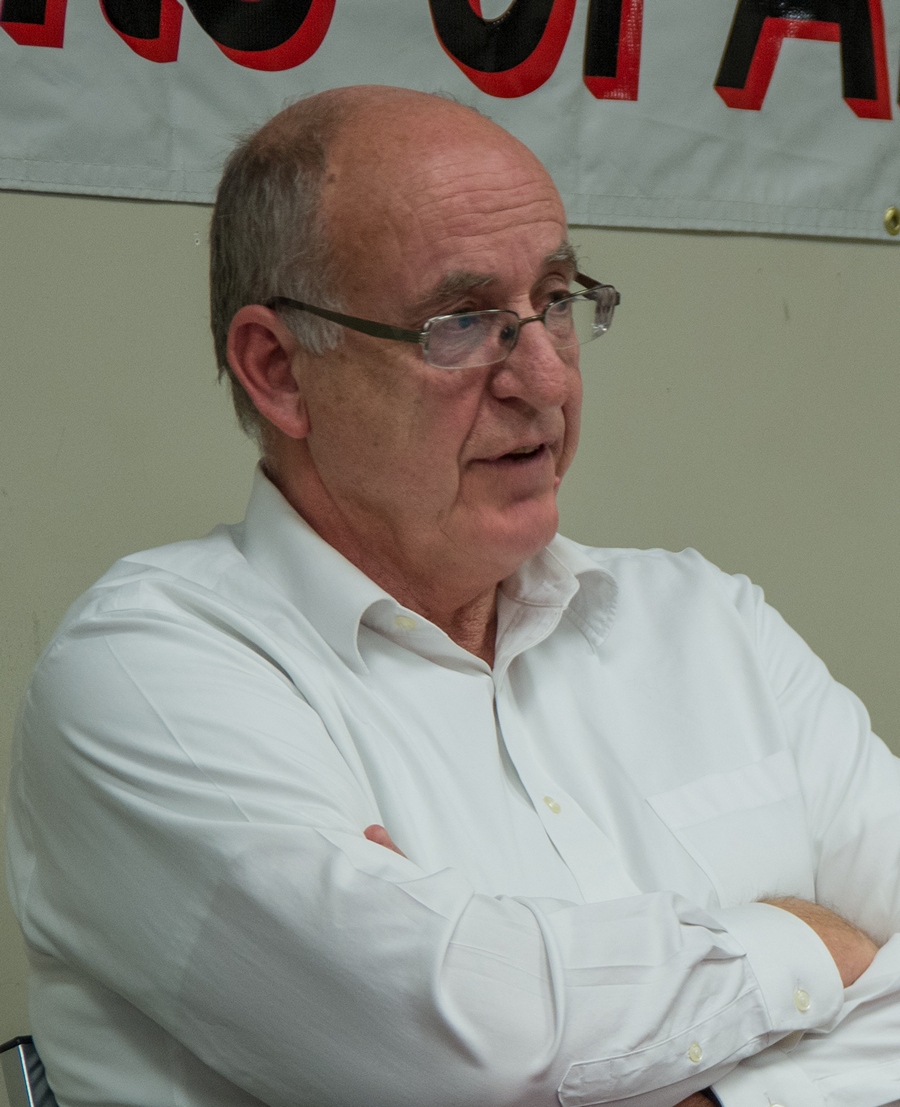 Similarly, Gerstenberger
pointed out that Trump's nominee for
Labour Secretary is Andrew Puzder, who is a fast food oligarch
and CEO of the monopoly that owns the Hardee's and Carl's Jr.
restaurant chains. He is known for his anti-worker positions and
support for the use of "undocumented" workers as "cheap labour."
Gerstenberger noted that the economy of southwestern California
would not be able to function without exploiting these vulnerable
workers. Puzder's openly anti-worker stands have given rise to
objections on the part of organized labour in the U.S., he added.
Puzder opposed the $10 an hour minimum wage under Obama and will
oppose the workers' current fight to raise this to $15 an hour.
Likewise, he will be opposing pensions, saying that no one wants
them anymore and they are a drain on society.
Similarly, Gerstenberger
pointed out that Trump's nominee for
Labour Secretary is Andrew Puzder, who is a fast food oligarch
and CEO of the monopoly that owns the Hardee's and Carl's Jr.
restaurant chains. He is known for his anti-worker positions and
support for the use of "undocumented" workers as "cheap labour."
Gerstenberger noted that the economy of southwestern California
would not be able to function without exploiting these vulnerable
workers. Puzder's openly anti-worker stands have given rise to
objections on the part of organized labour in the U.S., he added.
Puzder opposed the $10 an hour minimum wage under Obama and will
oppose the workers' current fight to raise this to $15 an hour.
Likewise, he will be opposing pensions, saying that no one wants
them anymore and they are a drain on society.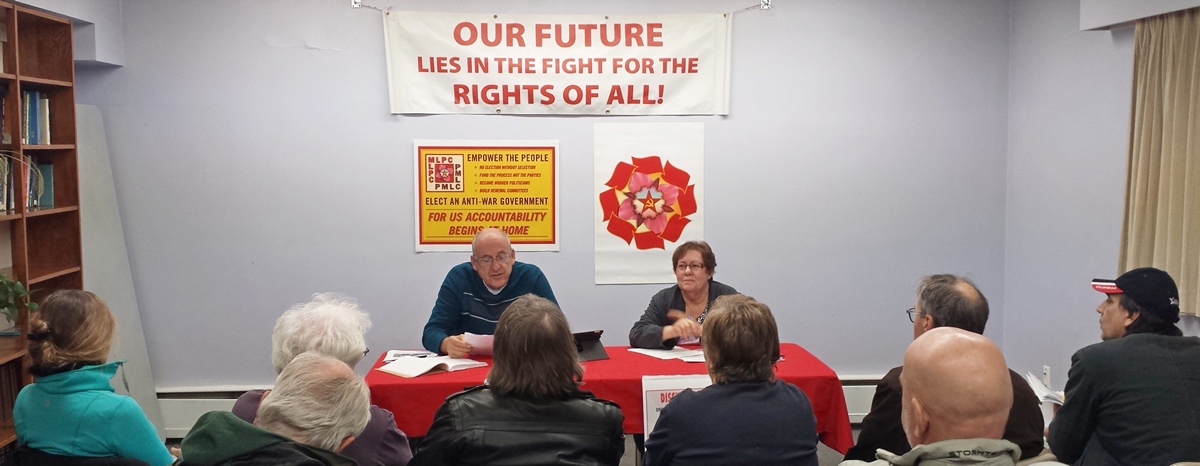
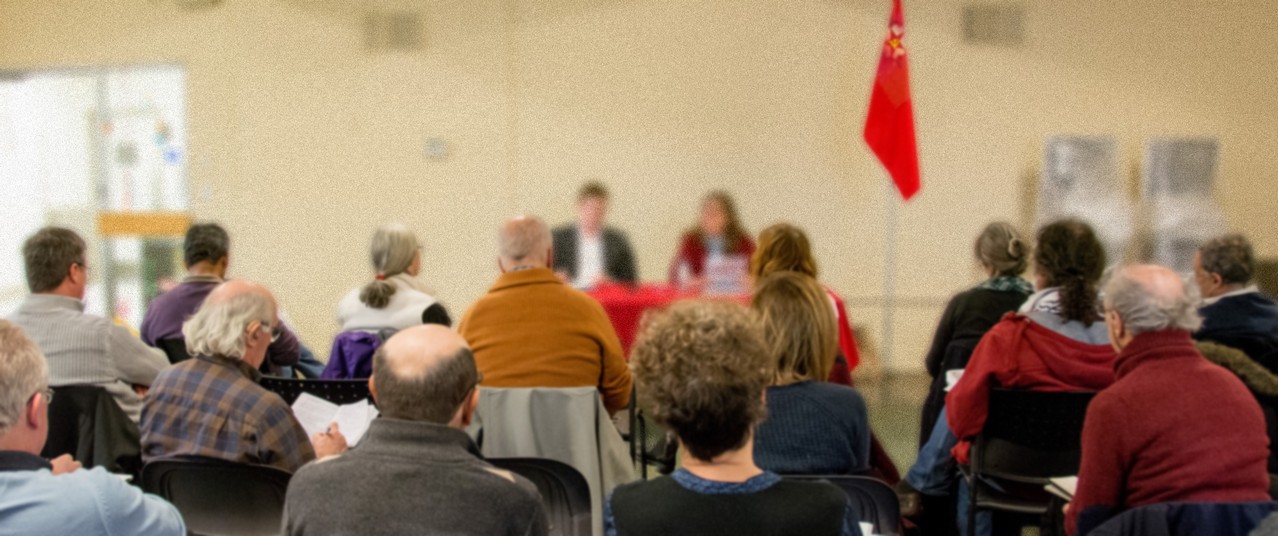


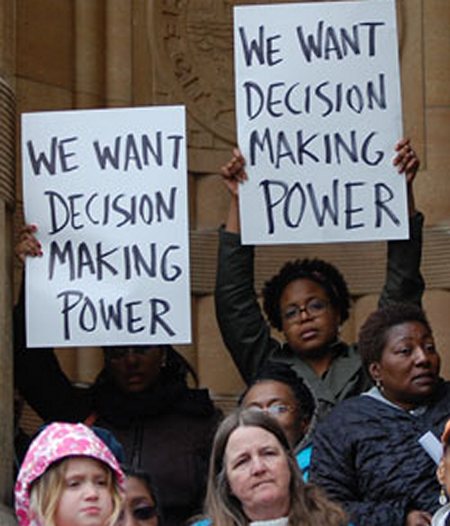 The situation gives rise to grave
dangers for the peoples at
home and abroad. We need to be pro-active by having our own
program which gives rise to new forms and gives birth to the new.
As we respond to all the attacks on the people, if we are
pro-active, the resistance movement will make great headway.
Political discussion and analysis on the significance of the U.S.
election results is the starting point to creating a political
movement which favors the people.
The situation gives rise to grave
dangers for the peoples at
home and abroad. We need to be pro-active by having our own
program which gives rise to new forms and gives birth to the new.
As we respond to all the attacks on the people, if we are
pro-active, the resistance movement will make great headway.
Political discussion and analysis on the significance of the U.S.
election results is the starting point to creating a political
movement which favors the people. In looking at these developments,
it is important to
recognize that police powers by their nature are arbitrary and
implemented on the basis of broad impunity. It is not just a
matter of police and military forces of various kinds taking
action, but rather a means of governance in a situation where the
rulers have no solutions and where they are compelled to block
the striving of the people to modernize and broaden democracy.
From its origins the U.S. state has had two aspects making a
single unitary power. One is the government of laws, including
the Constitution, treaties, legislation, courts, etc. The other
is police powers. What we are seeing now is the elimination of a
government of laws, with Trump positioned to do so even more
blatantly and with greater impunity than previous presidents.
In looking at these developments,
it is important to
recognize that police powers by their nature are arbitrary and
implemented on the basis of broad impunity. It is not just a
matter of police and military forces of various kinds taking
action, but rather a means of governance in a situation where the
rulers have no solutions and where they are compelled to block
the striving of the people to modernize and broaden democracy.
From its origins the U.S. state has had two aspects making a
single unitary power. One is the government of laws, including
the Constitution, treaties, legislation, courts, etc. The other
is police powers. What we are seeing now is the elimination of a
government of laws, with Trump positioned to do so even more
blatantly and with greater impunity than previous presidents.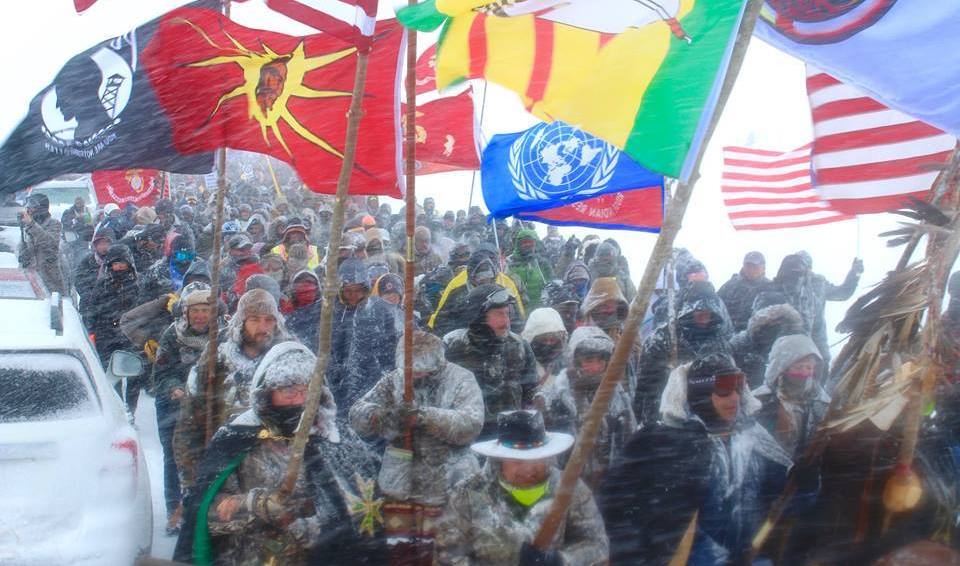
 Most recently, thousands of
veterans came to join the
resistance at Standing Rock and defend the camps from threatened
eviction by the state. This readiness of the vets to join in, to
stand against the government, no doubt frightened the rulers.
They need their soldiers, active and inactive, to be dutiful,
submitting soldiers, not part of the organized resistance. It is
to the credit of the Indigenous peoples and their undaunted fight
for their right to be and to be protectors of the land and of
rights, that they have inspired such support. And the overall
level of consciousness being developed against the state and its
imposing of police powers is an important contribution to all
those resisting.
Most recently, thousands of
veterans came to join the
resistance at Standing Rock and defend the camps from threatened
eviction by the state. This readiness of the vets to join in, to
stand against the government, no doubt frightened the rulers.
They need their soldiers, active and inactive, to be dutiful,
submitting soldiers, not part of the organized resistance. It is
to the credit of the Indigenous peoples and their undaunted fight
for their right to be and to be protectors of the land and of
rights, that they have inspired such support. And the overall
level of consciousness being developed against the state and its
imposing of police powers is an important contribution to all
those resisting. Now, the rulers face a situation
where the fetters of the
Constitution, such as Congress holding the purse strings, such as
treaties being law of the land, such as the arrangements in the
Bill of Rights, need to be eliminated. The way the rulers hope to
do this is to demand that everyone submit to their version of the
Constitution, and any emergency powers they may dictate in the
name of national security. Such powers are the president
executing the duties of his office. The rulers want to maintain
the constitutional form, while breaking the bounds of the
Constitution itself.
Now, the rulers face a situation
where the fetters of the
Constitution, such as Congress holding the purse strings, such as
treaties being law of the land, such as the arrangements in the
Bill of Rights, need to be eliminated. The way the rulers hope to
do this is to demand that everyone submit to their version of the
Constitution, and any emergency powers they may dictate in the
name of national security. Such powers are the president
executing the duties of his office. The rulers want to maintain
the constitutional form, while breaking the bounds of the
Constitution itself.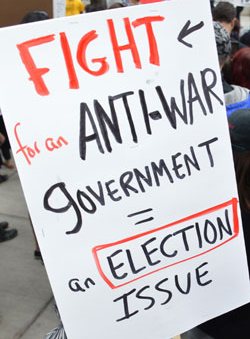 As well, the two key issues to examine are not
whether they
are generals or civilians, but the fact that a government of
unfettered police powers is being imposed and these individuals
are instruments for this. All the talk of civilians vs. generals
hides this reality. As well, it diverts from the fact that, as
during the campaign, the issue of war and ending all aggressive
U.S. actions, bringing all U.S. troops home, is not discussed at
all. There is silence on this issue.
As well, the two key issues to examine are not
whether they
are generals or civilians, but the fact that a government of
unfettered police powers is being imposed and these individuals
are instruments for this. All the talk of civilians vs. generals
hides this reality. As well, it diverts from the fact that, as
during the campaign, the issue of war and ending all aggressive
U.S. actions, bringing all U.S. troops home, is not discussed at
all. There is silence on this issue.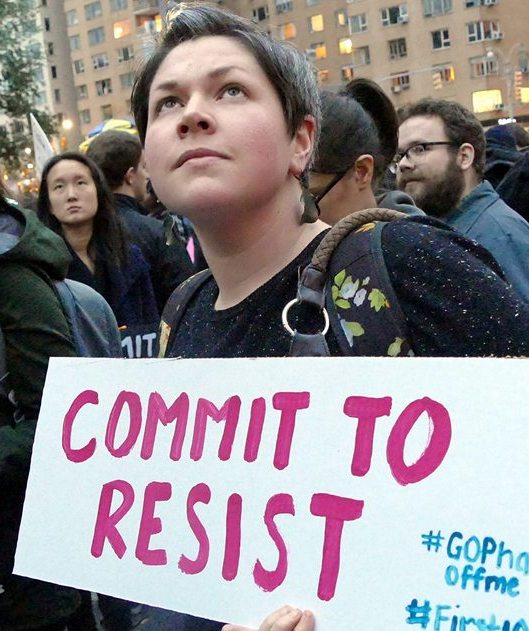 The problem to address is
that the voice of the working
class has been silenced and blocked. The problem to address is
how to develop and strengthen our own independent institutions,
for the press, for research, for political discussion, for
developing our own thought material so that the interests of the
working class are defended and our own institutions built. It is
not our job to side with one faction of the rulers or another in
their conflicts to sort out which is to emerge as the most
powerful. The working class instead has the duty to lead the
struggle for a democracy of our own making that serves the
interests of the working class and people.
The problem to address is
that the voice of the working
class has been silenced and blocked. The problem to address is
how to develop and strengthen our own independent institutions,
for the press, for research, for political discussion, for
developing our own thought material so that the interests of the
working class are defended and our own institutions built. It is
not our job to side with one faction of the rulers or another in
their conflicts to sort out which is to emerge as the most
powerful. The working class instead has the duty to lead the
struggle for a democracy of our own making that serves the
interests of the working class and people.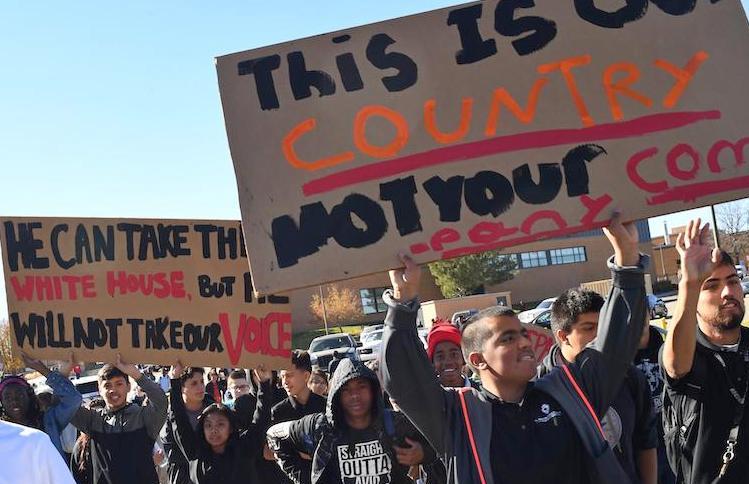 Across the U.S. the youth in
their tens of thousands are
already standing against this brutal direction, proclaiming Trump
is Not Our President! Democracy Not Oligarchy!
They
will not be silenced. There is recognition among them, as among
the water protectors at Standing Rock, that the political process
in place is not acceptable.
Across the U.S. the youth in
their tens of thousands are
already standing against this brutal direction, proclaiming Trump
is Not Our President! Democracy Not Oligarchy!
They
will not be silenced. There is recognition among them, as among
the water protectors at Standing Rock, that the political process
in place is not acceptable.